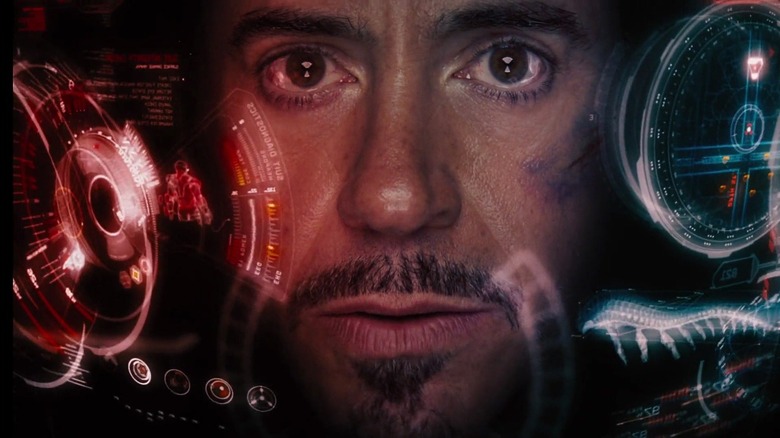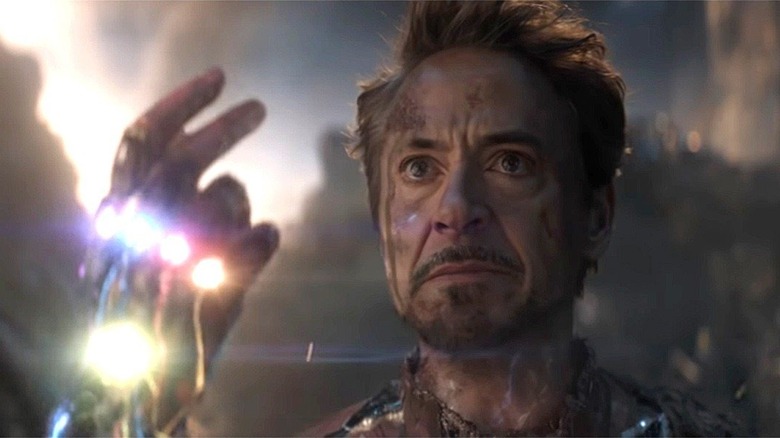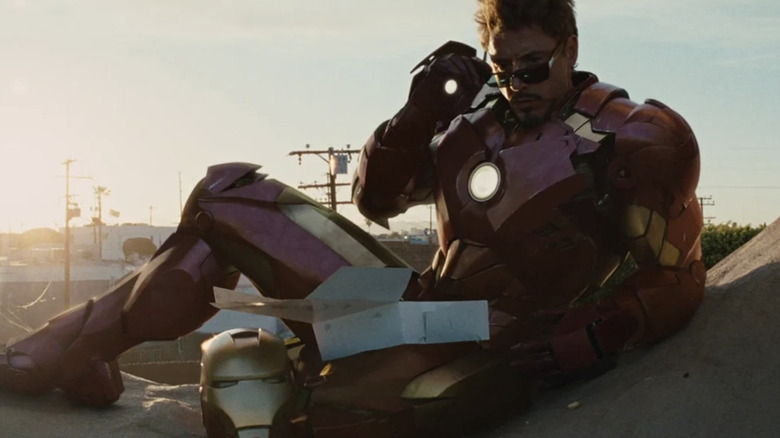The Ending Of Iron Man Explained
Every great story needs an equally great beginning, and since the beginning of the Marvel Cinematic Universe as we know it, few superhero stories have been quite as great as that of Tony Stark. This is not to say the "Iron Man" and "Avengers" films are great as in "objectively good." Rather, they're great in the sense that the connected story they tell is massive. So, to start a story as monumentally grand as the MCU, there needs to be a fitting beginning that (at least in retrospect) feels as grand as its ending.
Such is the case for the first "Iron Man" film, which truly sets the stage for the rest of the MCU almost perfectly. We see a hint of who its principal protagonist will become throughout the course of his journey. Likewise, the puppet masters in charge of the MCU elect to give us a small taste of big things to come. Finally, the movie's closing moments provide viewers a solid lead moving into the middle sections of the hero's story. In total, though the inevitable grandeur of what the MCU would become was still unthinkable at thay point, "Iron Man" lays a solid foundation upon which the rest of the MCU sits today.
Tony Stark is a changed (Iron) man
Though it is just the beginning of one larger story, "Iron Man" is also its own complete narrative. As a result, we see tangible change in the way Tony Stark (Robert Downey Jr.) thinks and acts. After all, "Iron Man" is a redemption story about a man becoming a hero to make up for the sins of his past.
When "Iron Man" begins, Tony is a guiltless snob. As a spoiled, genius rich kid, Stark hit the jackpot when it came to almost every aspect of his life. His company is one of the largest and most advanced weapons manufacturers on the planet, and Tony is either complacent or ignorant of the ways in which his products harm people. Regardless, he is not someone who sees himself as a hero. He is a renegade.
This changes, however, when terrorists use Tony's own weapons to capture him and force him to create more destructive tools for their crusade. Seeing the suffering caused by his own creations, Tony decides to turn a new leaf and become Iron Man. He cements this decision in the film's conclusion. Even though Tony is instructed by S.H.I.E.L.D. to remain anonymous in the face of Iron Man's newfound exposure, he decides to instead go public. "I am Iron Man," he announces with conceited confidence, showing that he is determined to adopt the identity of a selfless hero.
The movie paves the way for the rest of the MCU
Tony's public announcement that he is indeed Iron Man is just a taste of the determined hero we see at the end of "Avengers: Endgame." It's why he says those same words, "I am Iron Man" just before sacrificing himself. He is accepting the role of a hero. Robert Downey Jr. pointed to this being "the great Joseph Campbell mythology of [Tony Stark]" as a character who goes from selfish to selfless. (via The Off Camera Show). However, this is not the only way that the first "Iron Man" paves the way for the rest of the MCU.
Most of the methods that the MCU used to tease later movies are small, though they would seem obvious after 13 years of Marvel movies. The inclusion of S.H.I.E.L.D. Agent Phil Coulson, as well as the deliberate name dropping of the organization itself, was meant to hype comic fans with expectations over a large Marvel universe debuting on screen. This is hammered home in the post-credits scene, when Nick Fury approaches Tony Stark with plans for something he calls "the Avengers initiative."
In many ways, this event is also the beginning for the rest of Tony's journey in the MCU. Going back to Downey's reference to Joseph Campbell, Nick Fury's arrival is a "call to action" for Tony Stark. It's the first chance he gets to become part of something greater than himself.


